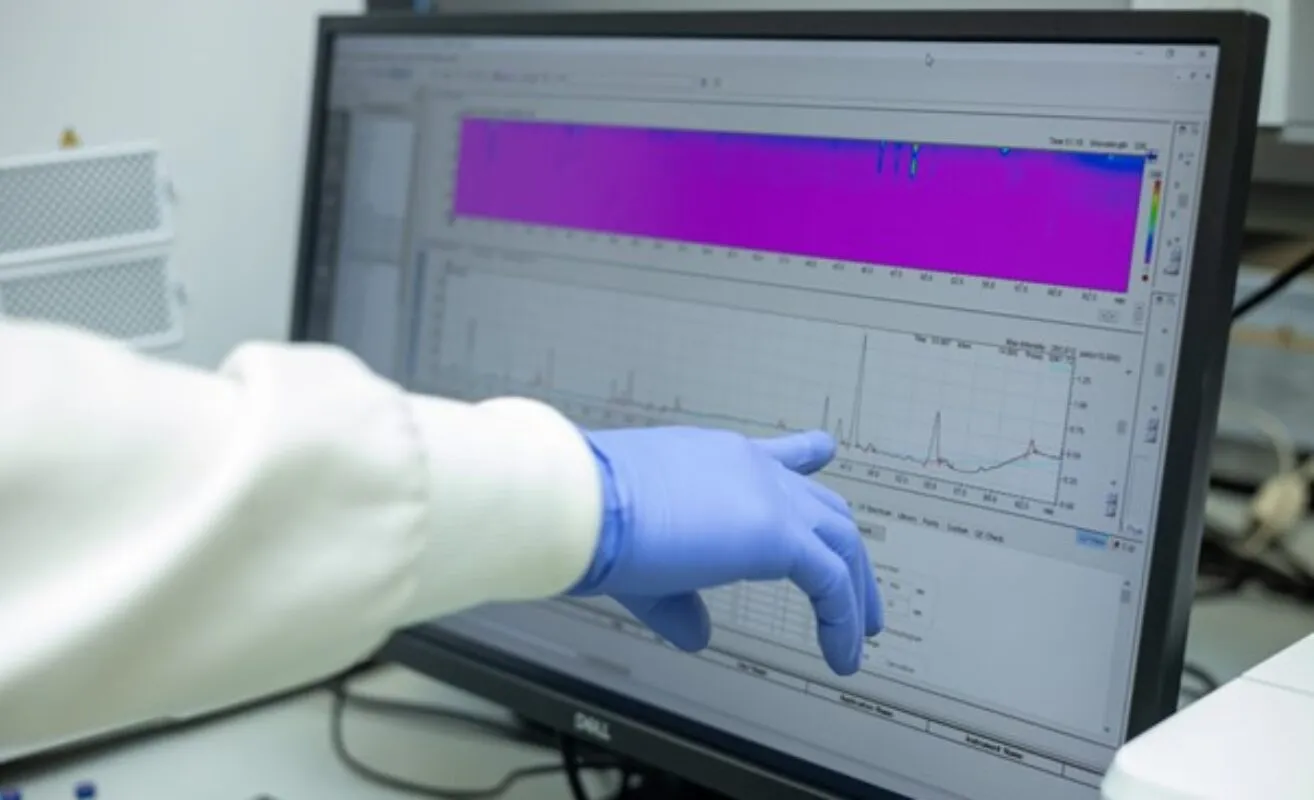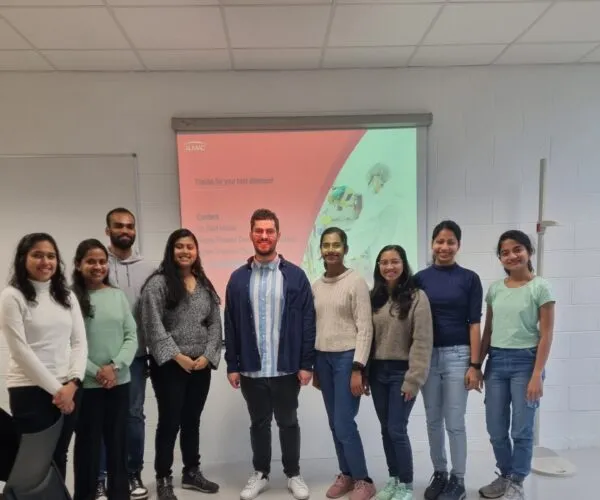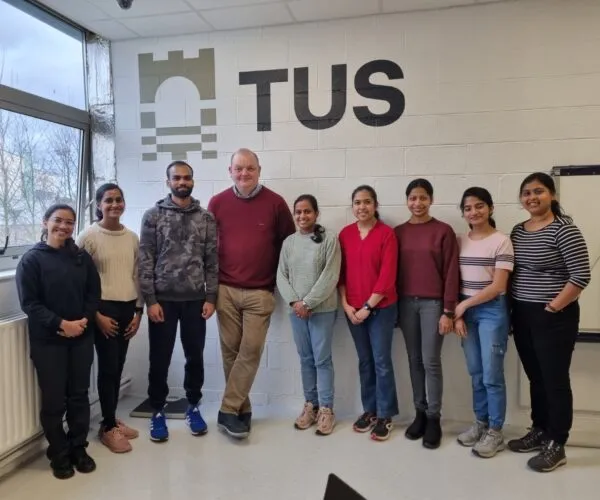Courses
Admissions & Support
Course Search
Courses
Admissions & Support
Course Search
Our Services
Our Community
Course Search
Professional Services
Status: Applications to programme now open to potential applicants
Campus: Athlone
years: 1
Fees: €7,800 EU applicants; €16,500* non-EU

Aim
This interdisciplinary MSc programme in Pharmaceutical and Chemical Analysis is designed to provide participants with industry-informed, expert knowledge and skills, in the application of modern, state-of-the-art, analytical techniques, which focus on pharmaceutical ingredients, products and other chemicals.
Objective
This postgraduate programme addresses the needs of industry across the pharmaceutical and chemical sectors. The programme is aimed in particular to address current employment shortages and skills deficits in pharmaceutical and chemical analytics. The programme is designed for science graduates and scientists currently employed in industry, who, through a multidisciplinary targeted approach, wish to further develop their analytical skills in advanced drug analysis, chemical analysis and toxicology. Enhancement of environmental sustainability by the pharmaceutical and chemical industries is also a key objective for the programme to address.
Expert training on the use of state-of-the-art, analytical, instrumentation will be provided. Graduates will gain insight into emerging developments in the growing, multinational, pharmaceutical sector in Ireland and across the EU. The programme will be delivered by a highly skilled, interdisciplinary team of academic staff, with analytical expertise across multiple domains (pharmaceutical and chemical sciences, pharmacy, pharmacology and toxicology). The programme will have a strong focus on the requirements of the pharmaceutical and chemical industries in a multinational, global setting. The programme will also draw on a wide body of industry partners at various stages over the delivery of the programme.
One of the main objectives of the MSc programme is to deliver a wide range of experimental-focused, analytical skills in modern laboratory settings. The programme also aims to equip the graduate to pursue a career as an analytical scientist employed in the pharmaceutical and chemical sectors or to prepare the graduate to embark on further postgraduate research studies across the pharmaceutical and chemical sciences. Through successfully completing this programme, the learner will acquire the competence to excel in the laboratory as an analytical scientist and facilitate career progression in this rewarding and multinational, industry-orientated field.
International Office
International Applications Queries
Email: International@tus.ie
Website: International Office
TUS Global Offices: Global Offices
Eligible candidates for the MSc/PgD should hold a first (1H) or a second-class honours (2H1 or 2H2) award class in a primary honours degree (NFQ, Level 8) or an international equivalent in a subject(s) related to that of the MSc/PgD programme (some examples of specialisation in honours degree programmes may include cognate areas such as: Pharmaceutical Sciences, Chemistry, Drug and Medicinal Product Analysis, Forensic and Pharmaceutical Science, Analytical Science, Toxicology, Pharmacy, Biochemistry etc. or an equivalent qualification).
Graduates who hold equivalent qualifications in cognate areas of science or technology or who have proven, relevant industrial experience will be considered for places on a case-by-case basis under the TUS Policy on Recognition of Prior Learning (RPL) 2022-2025.
Non-EU nationals must provide evidence of ability to take classes through the medium of the English language (IELTS 6.5 or equivalent). Applicants may be required to attend TUS for an interview. An online Zoom/Skype/MS Teams interview may be arranged for international students.
Advanced Analytical Techniques
Credits: 10
The material covered in this module concentrates on giving a sound foundation to the theory and application of modern instrumental techniques, reinforced through hands on use in the laboratory programme. It begins with the Analytical process. It introduces common analytical techniques including basic Spectroscopy and Chromatography techniques . It then expands into more advanced analytical techniques include Radiochemical Methods, Thermal Methods of Analysis, Microscopic Methods and Electrochemical Methods.
Bioanalytical Methods with Toxicology
Credits: 10
This module provides a comprehensive overview of bioanalytical methods and their connection to drug design and development. It explores the principles, techniques, and applications of various bioanalytical methods used to detect, quantify, and analyse small and large (bio)molecules. This module will provide learners with the opportunity to study toxicology in its position underpinning pharmaceutical/drug safety. Students will gain in-depth knowledge of cell and molecular mechanisms of drug induced toxicity, with an understanding of the principles of toxicology including toxicokinetics and toxicodynamics, target organ toxicity and genetic toxicology.
Standards and Regulation in the Pharmaceutical Laboratory
Credits: 5
This module describes management and standards in the pharmaceutical laboratory and compliance with external regulations and systems to maintain an effective and efficient laboratory. The roles of Quality Assurance (QA) and Quality Control (QC) as well as Lean Laboratory concepts are addressed as part of this module.
Research Methods and Professional Development Skills
Credits: 5
This module focuses on the skills needed to develop a research project and aims to equip the learner with the tools to help further their career development. The module has three components: Research Methods, Professional and Transferable Skills and Career Development and Continuous Professional Development (CPD).
Method Development for Pharmaceutical Chromatography
Credits: 5
This module provides a comprehensive coverage of modern chromatographic theory, methodologies and applications from the perspective of method development.
Characterisation of Pharmaceutical Materials and Polymers
Credits: 10
The aim of the module is to provide an in-depth focus on a range of characterisation techniques widely employed in both the pharmaceutical and chemical industries and research relevant to the analysis of pharmaceutical materials. The module also concentrates on the evaluation and characterisation of pharmaceutical polymer excipients used in manufacturing processes to confirm identity and ensure quality, stability and purity of polymer ingredients.
Applied Spectroscopic Analysis
Credits: 5
The aim of this module is to give students an in-depth knowledge of modern spectroscopic techniques for structural analysis. The main emphasis for this module will be on IR, MS and NMR. Theory and application to chemical research problems will be discussed. Emphasis will be placed on training the students to interpret spectra and to design experiments to address research problems. The student will learn to perform the most commonly used NMR (1D and 2D NMR spectra) experiments, and to interpret and document their results. Instruction will include lectures, practicals, spectroscopy workshops and individual case studies.
Data Analysis for Analytical Scientists
Credits: 5
This module will provide the learner with a solid foundation in a wide variety of data analysis techniques used in the analytical sciences including univariate and multivariate analysis with particular emphasis on the ability to design experiments and critically analyse the data produced.
Industry Oriented Workshops
Credits: 5
This module will provide students with insights and knowledge of working in the pharmaceutical industry. Workshops provided by internal personnel and external industry experts will impart valuable knowledge thereby helping to bridge the gap between academia and industry.
Research Project
Credits: 30
Students will conduct an independent research project either in an academic research laboratory or an approved industrial setting (subject to availability). Upon completion of this module the student will have adopted a reflective critical approach to learning in addition to advancing their problem-solving and interpersonal skills.
Multiple career opportunities for graduates of this programme include employment in positions such as:
Graduates from the MSc programme in Pharmaceutical and Chemical Analysis will be ideally positioned to progress to NFQ Level 10 PhD programmes in a cognate area at TUS or other universities in Ireland or internationally.
Learners registered on the Postgraduate Diploma in Pharmaceutical and Chemical Analysis take the same suite of modules in Semester 1 and Semester 2 as the MSc registered students, which is the equivalent of 60 ECTS, but do not take the additional 30 ECTS involving the Research Project.
A variety of teaching and learning strategies feature across the delivery of this programme, reflective of the different nature of each of the various modules. The MSc/PgD programme is designed across five thematic areas based on the following pillars:
In line with the Quality and Qualifications Ireland (QQI) Awards Standards for a Level 9 Science programme, one of the main outcomes expected from this MSc programme, will be a TUS graduate who is able to think independently, act autonomously, make informed decisions and show critical awareness of current problems and/or new insights, and is generally informed by the forefront of a field of learning. To effectively achieve this programme outcome, independent student learning is one of the primary building blocks of this programme.
Students on this programme are expected to be independent learners meaning that they are active learners and take full professional responsibility for their studies, workload, academic commitments and deadlines. Independent learning fosters an environment for the learner where they can think and work independently without receiving on a continuous basis the same level of support that they would receive from academic staff. Independent learning is the hallmark of any Level 9 postgraduate student.
On this MSc in Pharmaceutical and Chemical Analysis programme, the outcome of this independent learning should be effectively evidenced by the 30 ECTS Research Project module. This project will be supervised by an academic member of staff at TUS (either from the Midlandsor Midwest campus) and the project may be conducted cross-campus within the university, at an international university partner (e.g. RUN-EU partner) or at an approved industry partner (all subject to availability in a given year), either in an industrial setting or on one of the TUS campuses.
2023-2024 MSc in Pharmaceutical and Chemical Analysis students with Dr. Paul Massé from Arran Chemical Company (Almac) who gave a presentation to the group as part of the 5 ECTS Industry Orientated Workshops Module


2023-2024 MSc in Pharmaceutical and Chemical Analysis students with Willie McCormack, Director, Laboratory Services & QP, Jazz Pharmaceuticals, Athlone, who gave a presentation to the group on February 22,2024 as part of the 5 ECTS Industry Orientated Workshops Module. Jazz Pharmaceuticals is one of the Enterprise Partners of TUS on the HCI Pillar 3 Project on Virtual Labs, with co-collaborators MU (Project Lead), DCU, UCC and DkIT. As part of the MSc programme students engage in Virtual Laboratory Simulations as part of their Pre- and Post-Lab. Activities.